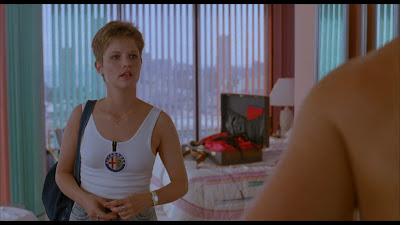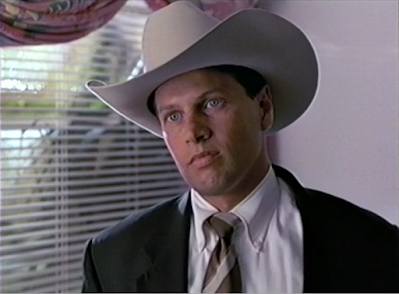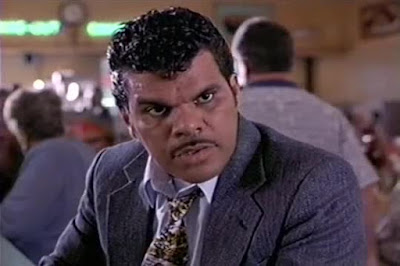"The Sunshine
State is a paradise of scandals teeming with drifters, deadbeats, and misfits
drawn here by some dark primordial calling like demented trout.” – Carl Hiaasen
We meet homicide detective Hoke Moseley (Ward) negotiating money with a blind informant, which is the kind of colorful introduction that tells us a lot about his character. He and his partner (Charles Napier) investigate the Krishna murder and the scene illustrates the short-hand between these two men who have obviously been partners for a long time, while showcasing the film’s black humor: “Your turn to notify next of kin,” Hoke says to his partner who replies, “No way! I did the fat lady that sat on a kid. That’s good for two.” It’s great fun to see these two veteran actors share a scene together, lobbing dialogue back and forth. One almost wishes a prequel had been done about these two characters.
Junior is a career criminal who sees the world as a playground. If he wants something he takes it. Someone gets in his way he removes them. He is all about taking short cuts. The first third of the film mostly focuses on Junior’s exploits as we see him spotting a two-man pickpocket team and follows the guy with the loot into a public bathroom, beats him up, and takes the money. He’s a ballsy crook, buying a realistic looking water gun and then robbing a bunch of guys on the street. Baldwin looks like he’s having a blast playing Junior as a legend in his own mind as he sits in his hotel room at one point with a bunch of money, pretending he’s Al Pacino in Scarface (1983). He is excellent as a clever crook whose fault is that he never plans his crimes ahead of time. He’s spontaneous and this works for awhile but eventually catches up to him.
Associate producer William Horberg gave Miami Blues to Fred Ward soon after it was published. After reading it, he thought it would make for a great film. “It has a certain irony about it, a certain dark comedy that I like. It’s a little absurd. There’s a random violence in it that I thought was very real,” Ward said in an interview. He optioned the book rights for a two-year deal with $4,000 that the actor paid out of his own picket. He brought it to friend and filmmaker Jonathan Demme, with whom he had worked with on Swing Shift (1984), in the hopes that he’d direct. Demme, just having shot Married to the Mob in Miami (1988), demurred but suggest another friend of Ward’s – George Armitage – to direct instead. Demme knew Armitage from when they were starting out, making films for Roger Corman. He read the book and loved it, going on to write a spec screenplay and agreed to helm it with Demme producing along with Gary Goetzman. Ward had pitched the project to Orion Pictures on two occasions and was turned down both times until he showed them Armitage’s script. They agreed but only if a young actor was cast in one of the lead roles.
In his review for Entertainment Weekly, Owen Gleiberman wrote, “By the time Miami Blues winds into its crushingly bloody, absurdist finale, the only question of any urgency is, Which actor has become harder to watch: Baldwin with his histrionics or Fred Ward flashing those naked gums?” The Los Angeles Times’ Peter Rainer wrote, “This is the problem with the action-filmmaker’s anything-for-a-jolt ethos: Whatever doesn’t jump-start the story is skimped. In fact, in Miami Blues, the story is all jump-starts. I realize that this may be all that most people require from a glorified programmer like Miami Blues, but the film has so much finesse, and its best moments are so freakishly dippy, that you regret the devaluation.”
Pinkerton, Nick. “Interview: George Armitage.” Film Comment. April 28, 2015.
Van Gelder, Lawrence. “Miami Splice.” The New York Times. September 30, 1988.
Van Gelder, Lawrence. “Fred Ward’s Blues.” The New York Times. April 20, 1990.







